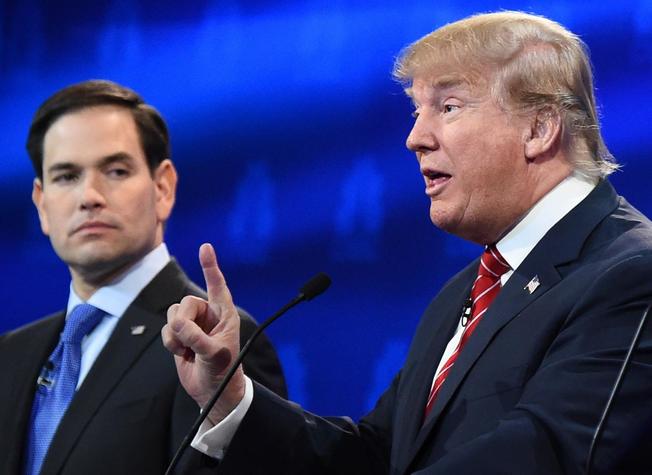The Florida senator delivered a surprisingly strong finish in Iowa by embracing the frontrunner’s rhetoric.
Marco Rubio’s last minute surge in Iowa has a lot in common with John Kerry’s last minute surge to victory in Iowa in 2004. Like Rubio, Kerry was an early frontrunner. Like Rubio, Kerry underperformed all fall as an anti-establishment candidate (Howard Dean) came from nowhere to dominate the field. Like Rubio, Kerry benefitted in the closing weeks from a nasty battle between the two Iowa frontrunners (Dean and Richard Gephardt). Like Rubio, Kerry counterpunched in those final weeks by stressing his electability. Among the Iowans who called electability “crucial” to their vote, Kerry beat Dean by 16 points. Among the Iowans who said they cared most about which candidate could “win in November,” Rubio beat Trump by 18.
For party insiders, Kerry’s success proved that Democratic voters had come to their senses; that Dean’s moment had come and gone. But that wasn’t right. Kerry had beaten Dean not by challenging the Vermont governor’s anti-war message but by pledging to more effectively sell it. In October, Kerry voted against a bill to fund the Iraq war he had once voted to authorize and “began to sound more and more like an antiwar candidate.” One poll found that 13 percent of Iowa voters considered Kerry the candidate best described as having “opposed the war.” As Dean’s pollster would later lament, Kerry was “liberally borrowing our message.”
This year, Rubio did something similar. He surged by borrowing Trump’s message while pledging to more effectively package it. In the final weeks before Iowa, Rubio grew markedly more anti-immigration. Having previously warned against using terrorism as a pretext to restrict legal immigration, the Florida senator in mid-January declared that because of the rise of ISIS, “the entire system of legal immigration must now be reexamined for security first and foremost.” He also followed Trump’s lead on trade, suggesting that he might oppose the Trans-Pacific Partnership agreement he had once praised.
Rubio echoed Trump when it came to the rights of Muslims, too. Asked in a January debate about Trump’s call for banning Muslim immigration, Rubio praised the billionaire for having “tapped in to some of that anger that’s out there about this whole issue because this president has consistently underestimated the threat of ISIS.” Then, after talking about how awful ISIS is, Rubio declared that, “When I’m president. If we do not know who you are, and we do not know why you are coming when I am president, you are not getting into the United States of America.” The listener who didn’t already know Rubio’s position might well have thought he supports Trump’s plan. When asked about Trump’s call for closing mosques, Rubio did Trump one better, declaring that, “It’s not about closing down mosques. It’s about closing down any place—whether it’s a cafe, a diner, an Internet site—any place where radicals are being inspired.”
Source:Peter Beinart, http://www.theatlantic.com
 Listen Online
Listen Online Watch Online
Watch Online Find a Station in Your Area
Find a Station in Your Area









 Listen Now
Listen Now Watch Online
Watch Online
